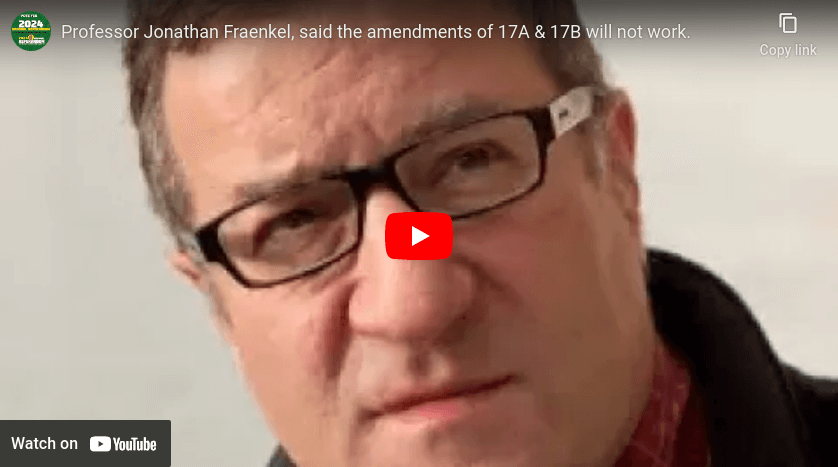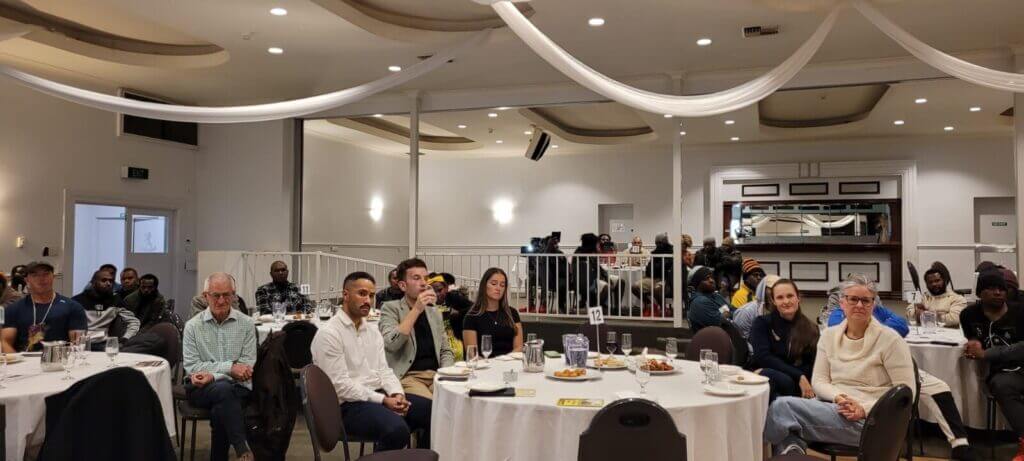By Kiery Manassah.

All media platforms are currently hotbeds of debate over the national referendum regarding two significant amendments to the national constitution. The vote scheduled for May 29th 2024, is the first in the country’s 43-year history and the changes to the constitution aim to address one of the country’s longstanding concerns – political instability.
The national vote will be on two seemingly very innocuous changes to the constitution. In summary, 17A and 17B are two additional Sections to Article 17 of the Constitution covering how a member can vacate their seat if they are sacked by their political parties or fail to align with an established party. Ultimately the two extra sections strengthen political parties and give them more powers to define and dictate the formation, and therefore the policy direction of a government, instead of independent MPs, those representing movements or parties with a single member.
As the changes give political parties the upper hand, the amendments have clearly irked some. It would seem however that a larger majority have had enough of the political instabilities. They believe it is time to vote ‘yes’ to the changes for the better; to prevent grasshopping MPs from changing their political affiliations overnight, resulting in political instability.
There are those who vehemently oppose the referendum. These seem to be coming from various vantage points, but primarily those who have either stood as independents, or whose parties or movements with no ‘national’ reach (therefore limited support base), and consequently, a narrower policy agenda.
In light of the distinctly opposing views, could it be that the polarizing nature of the debate is reason to believe that the referendum questions have struck at the very heart of the political instability curse? I think it has. And it appears that most of those against the referendum have very superficial reasonings. Most either border on ignorance, superstition, or even outright lies.
There is really nothing sinister behind the referendum. A referendum is provided for under the constitution, thanks to the wisdom of the framers. In article 86, the constitution is quite specific on which areas of life must be decided by a referendum. It stipulates that any changes to the parliamentary system, the electoral system, or the status of the three languages adopted at independence must be decided by referendum.
Prior to the current conversations, late last year, because of the constant changes in government, young people, with support from local community activists and leaders, staged a peaceful protest to the national parliament complex to express their dissatisfaction over constant floor crossings and changes in the political leadership. The march – whilst not overwhelmingly large, it was unprecedented. In many ways, it reflected a changing psyche of a growing number of young people who are increasing in confidence as they become more and more cognizant of their civic responsibilities.
One would have to be blind or deaf to disregard the clear fact people are sick to death over the constant bickering in parliament. Most, especially investors want consistency and stability for their investments to bear fruit. Voters want their MPs to be more accountable and responsible for their actions. In fact, towards the end of 2023, one could almost hear quiet whispers from behind the closed doors or curtains of the public service of people grumbling about the shenanigans of politicians.
Given this backdrop, all these hullaballoos about the ‘No’ vote in some ways, are surprising.
The one point that seems to be holding some ground is Article 5 of the Constitution which provides for the fundamental rights of citizens. Proponents feel that if 17A and 17B were to go through, then something must be done to sections of Article 5 to make them harmonize. The position of the government – based on legal advice from the Office of the Attorney General, one’s rights as an MP could be brought under some control for the sake of stability.
Personally, I have argued with friends on social media that as the rights under Article 5 are not ‘absolute’, as a citizen I am prepared to make the sacrifice; to give stability and consistency in the policy making process a chance. I believe sacrificing an MP’s right to express (as opposed to the right to move) is a minor price to pay, if this would make Vanuatu more stable politically.
In fact, it could be argued that because all fundamental rights are not ‘absolute’, they could be restricted because MPs haven’t been responsible enough in their conduct. The Attorney General in an earlier VBTC panel discussion referenced a 2004 case between Vohor and Abiut where the Court of Appeal ruled that the rights granted to members of parliament were special rights that could only be exercised when parliament was in existence. Those rights, according to that judgement could not be elevated any higher, even above a Council of Ministers, let alone people’s rights to democratically decide how MPs exercise their roles on the floor of parliament, especially in relation to a motion of no confidence.
Take freedom of expression for instance. My right to write this opinion piece has to be cast in such a way that it is read and accepted as fair, and does not infringe upon other people’s rights to privacy for instance. As long as I am being ‘fair’ and accurate and the topic is of public interest, then that is acceptable as far as freedom of expression is concerned. No way does my right to write give me the license to accuse people falsely. That would be a step too far.
Some have even questioned the wisdom behind the referendum, and feel this should fall within the ambit of the roles of elected members. ‘We have given you our mandates to decide on our behalf; there is no reason we should be bothering with this issue,’ is the common argument. Not only is such an argument fallacious; it is not democracy. People forget that elections are held in order for us to avoid direct democracy (which is quite impractical). In other words elections enable us the voters to hold our elected representatives accountable for their performance. Accountability is compromised when they do not care for the wishes of their constituents.
There are also naysayers who feel the referendum is misconceived and therefore should not be rushed. Even the leader of the opposition Ishmael Kalsakau – as of last weekend has come out in support of calls to refer the changes to the Supreme Court, or even to delay the vote till next year. Whether the amendments are actually referred to the Supreme Court remains to be seen but if it is done, it has to come from someone with the right ‘locus standi’ or someone else outside of the government because the government has made its intentions known. Some wish this be done by the head of state. There’s little reason to believe he will because of the reasons further explained below.
A few words on ‘delaying’ the vote. You will remember that towards the end of 2023, the executive branch of government was literally in a state of limbo, following an intervention from the Head of State, Excellency Nikenike Vurobaravu. The move by the president was a last ditched attempt to prevent a potential dissolution for a record second time in less than 15 months.
Literally the country arrived at this juncture by chance – not by design. Thus, for me waiting for another time might never come, given the fragility and fluidity of local politics.
In 2014, I happened to be part of some of the initial discussions while serving in former Prime Minister Joe Natuman’s cabinet, to try and address the political instability woes. I remember there was firm support from the commonwealth to fund some of the reforms. As a start, the Commonwealth brought in Papua New Guinea’s Political Parties Registrar – Dr Alphonse Gelu who spoke about the experience from Papua New Guinea. It has been 10 years since. So many leaders have towed with the idea without ever setting anything concrete in motion.
Obviously, I am one from the ‘yes’ group. But I also believe the government could do more to bring about lasting stability. I wrote last year that I hope this was the start of more to come. Vanuatu needs to stand up and be counted. We cannot continue to travel the path we have been on and expect to grow the economy. Maybe it will not solve the issue of instability completely but it is a good start.
Rest assured a sitting PM may still be removed (if he is so corrupt) by a motion of no confidence. Only this time, it will be through political party lines, not through the power of individual MPs. For too long Vanuatu politics has been held to ransom by party renegades and upstarts. The perfect time for reform has arrived. Vanuatu must grab the opportunity with both hands to stem the tide on political one-upmanship and instability


